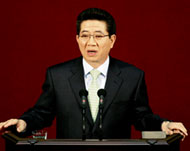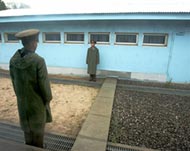US to take decision on N Korea soon
The US is likely to decide within weeks on whether to take the North Korean nuclear issue to the United Nations, where sanctions could be imposed on the isolated communist state, a senior US defence official has said.

The US official’s comment reflects growing frustration over Pyongyang‘s failure to return to six-party negotiations aimed at persuading the North to abandon its nuclear ambitions.
The last round of talks was held in June 2004.
Taking the issue to the UN Security Council, which Pyongyang opposes, “is something we’re giving increasing study to and probably will come to a decision over the next few weeks”, the official said on Sunday.
“We have the one anniversary (of the last six-party talks) but, moreover, we have an escalating downward spiral of threats by North Korea and it appears to be marching to its own frustration drum. It’s a very good time to be talking about it, the June-July period,” he said.
 |
|
S Korean President Roh is due to |
South Korean President Roh Moo-hyun is due to meet President George Bush in Washington on 10 June for talks that could be crucial to the way forward on North Korea.
US Defence Secretary Donald Rumsfeld touched only lightly on the subject in separate meetings in Singapore on Saturday with his South Korean and Japanese counterparts, the senior Pentagon official said.
But Deputy Undersecretary of Defence Richard Lawless, now in Singapore with Rumsfeld, was heading to Seoul later in the day for further talks on the nuclear issue and on US troop restructuring ahead of Roh’s US visit.
The Bush administration has long held out the possibility of asking the UN Security Council to take action as a means of holding Pyongyang accountable for breaking its international commitment not to pursue nuclear weapons.
Sanctions possible
Although sanctions could be imposed, US officials have said efforts will be likely to start with some lesser expression of international concern.
 |
|
Pyongyang has already declared |
But China and Russia, two of the five veto-wielding Security Council members, have opposed such a move.
Both are part of the six-party process, which also includes the US, Japan, and the two Koreas.
The senior defence official said he did not believe the US administration had formally approached other states about taking North Korea to the Security Council.
But he said: “I think there is very broad consensus that if the North Koreans haven’t made a conscious decision to come back to the table, and in some way communicated that in the June timeframe, we need to sit down and discuss collectively where we all go from here and develop a common roadmap.”
“I think that’s the scent that’s in the air,” he added.
He described Pyongyang‘s 10 February declaration that it is now a nuclear weapons state as a “mile marker”, because it suggests the North is only willing to come back to the talks under a different “arms control” format.
Japan‘s Mainichi Shimbun newspaper reported on Saturday that US and North Korean officials had spoken recently by telephone, a possible sign that Pyongyang was ready to give its decision over a return to the six-party talks.
Allied tensions
Rising tensions between Japan and China and between Japan and South Korea had complicated efforts to coordinate diplomacy on North Korea “to a small degree”, the official acknowledged.
But North Korea‘s declaration of nuclear weapons state status and expanding arsenal “really does have a galvanising effect on all of the other parties”, he said.
Another Japanese daily said on Sunday that Beijing had warned Pyongyang of possible sanctions should it conduct a nuclear test.
China, which is the North’s main provider of fuel and other supplies, told its communist ally that such a test would breech a “red line” and might result in Chinese sanctions, the Nihon Keizai Shimbun said, without giving a source.
China’s role
Australian Defence Minister Robert Hill, speaking after talks with Rumsfeld in Singapore on Sunday, said he would visit Beijing next week and urge China to be “more pro-active on the issue as well”.
“They (the Chinese) have considerable influence and we would like them to use all of that influence to encourage North Korea to return to the table,” Robert Hill, |
“They have considerable influence and we would like them to use all of that influence to encourage North Korea to return to the table,” Hill said.
In recent weeks the US has pursued twin tracks to get Pyongyang back to the table. While affirming a commitment to a “flexible” dialogue, it has also suspended a long-running and successful joint search with Pyongyang for missing American servicemen from the Korean War and deployed Stealth fighters to the region for training.
Regional powers believe North Korea has one or two nuclear weapons and possibly more than eight.
Three rounds of six-way talks made no progress. A fourth set for September never materialised after Pyongyang demanded Washington first drop what it called hostile US policies.